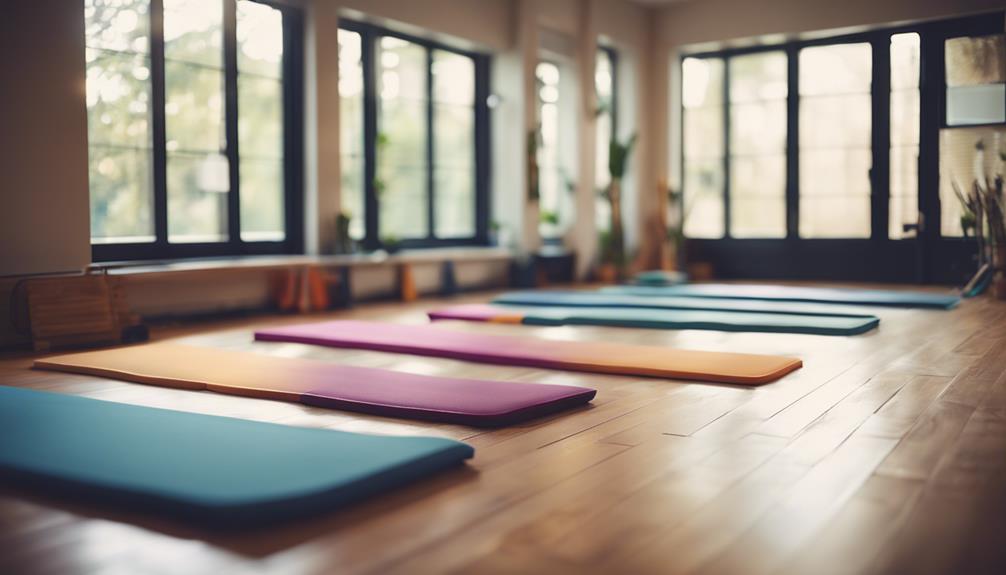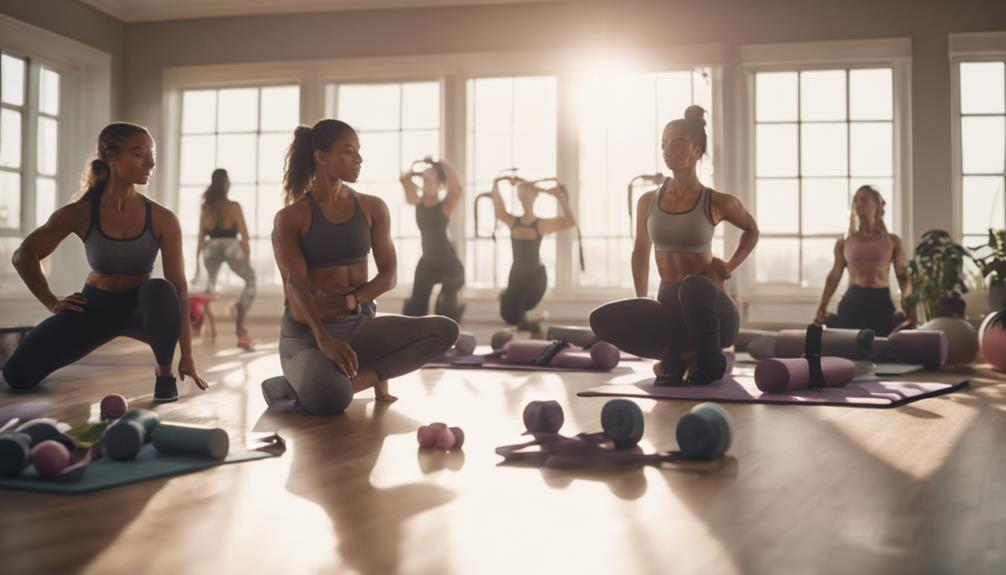You can transform your body with this exciting 30-day fitness challenge! Each day, you will complete 20-minute workouts that alternate between strength training and cardio to keep things interesting. You will target specific muscle groups with bodyweight and dumbbell exercises for effective toning. By incorporating circuits that focus on your upper body, lower body, and core, you will improve your endurance and overall health. Additionally, dedicated rest days will ensure proper recovery. Remember to stay hydrated and eat well to optimize your results. Curious to see how it all comes together? There is plenty more to discover on your fitness journey!
Key Takeaways
- The 30-day fitness challenge combines strength training and cross-training with 20-minute workouts for effective body sculpting.
- Circuit A, B, and C target specific muscle groups, enhancing endurance and overall health.
- Proper form is crucial for injury prevention and maximizing workout effectiveness during resistance training.
- A balanced diet and hydration are essential for muscle growth, recovery, and optimal performance throughout the challenge.
Overview of the Fitness Challenge

The fitness challenge is a dynamic 30-day program that combines strength training and cross-training to fit seamlessly into your daily routine.
You'll engage in 20-minute workouts that alternate between various exercises, ensuring you never feel bored. With customizable options for bodyweight or dumbbell exercises, this challenge is perfect for beginners and those looking to enhance their fitness levels.
Throughout the program, you'll experience a mix of lower body, upper body, and full-body workouts, all designed to improve your muscle definition. The variety keeps your body guessing and helps build workout consistency, vital for achieving long-term results.
Each week also includes a dedicated rest day, allowing your body to recover and adapt. This is essential for preventing burnout and ensuring you listen to your body's needs.
Weekly Workout Schedule
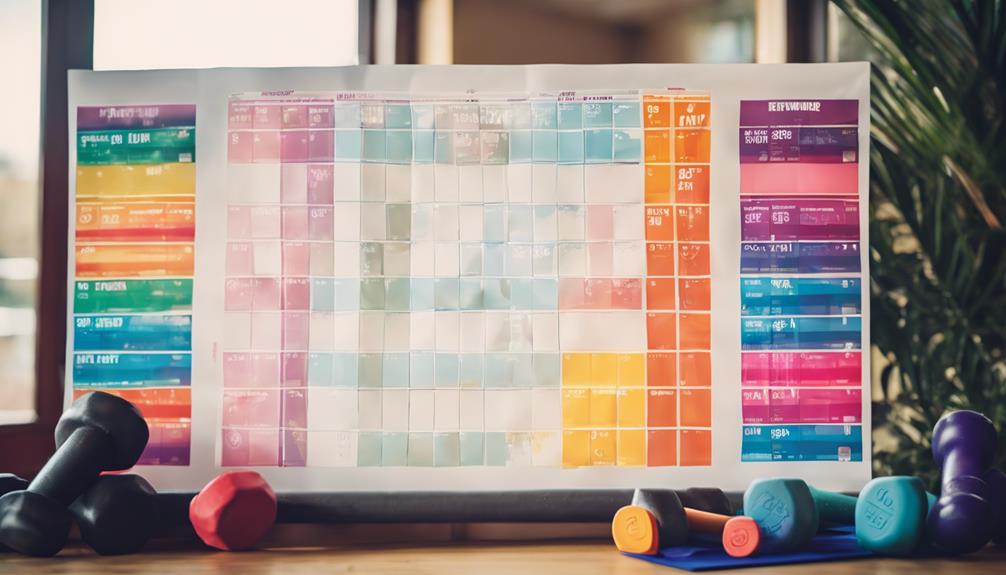
Wondering what your week looks like? Here's a detailed workout schedule designed to keep you engaged and progressing throughout the fitness challenge. This plan combines cardio and strength training sessions to promote total-body fitness, ensuring you target different muscle groups throughout the week.
- Day 1: Start with CardioStretch to enhance flexibility and set the tone for the week.
- Day 2: Immerse yourself in Circuit A, focusing on bodyweight or dumbbell workouts to build strength.
- Day 3: Engage in Circuit B, incorporating exercises like push-ups and lunges, adapting to your fitness level.
- Day 4: Hit Circuit C for a total-body workout that challenges your muscles.
On Day 5, you'll repeat Circuit A, while Day 6 brings Circuit B back into the mix.
Finally, Day 7 is your well-deserved rest day, allowing for recovery to prevent burnout and support muscle repair.
This daily exercise routine keeps you on track, helping you achieve your fitness goals while ensuring you feel energized and motivated every step of the way!
Circuit Breakdown
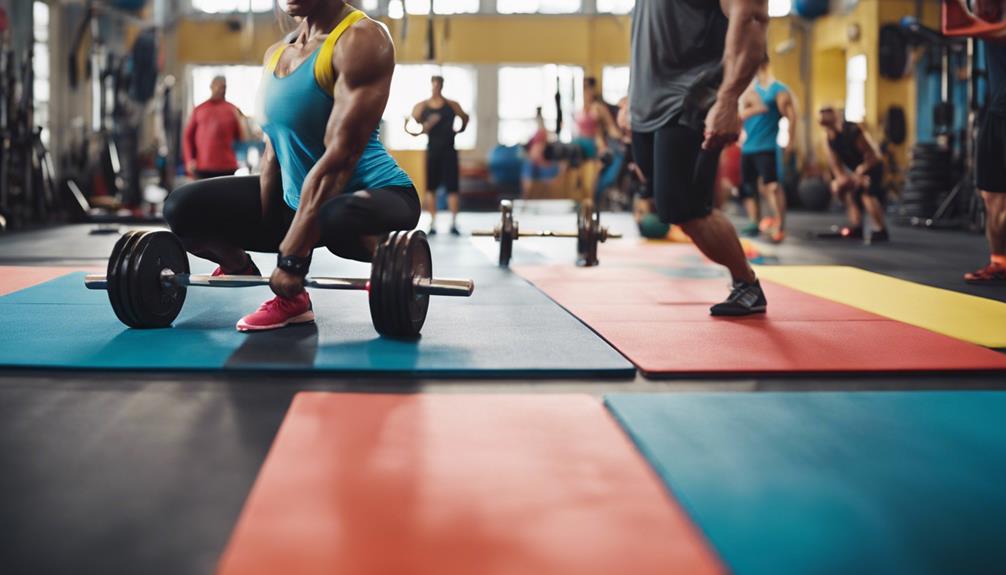
Explore the details of each circuit to understand how they target different muscle groups and enhance your overall fitness. This challenge features three strength circuits: A, B, and C.
Circuit A focuses on your chest, triceps, and butt, incorporating exercises like push-up/plank combos and reverse lunges. Here, you'll aim for 15 to 25 repetitions, allowing you to adjust based on your fitness level.
Moving on, Circuit B targets your back, biceps, and thighs with plié squats and biceps curls, ensuring a balanced workout that engages all major muscle groups.
Similarly, Circuit C emphasizes core strength through controlled movements like roll-ups and side reaches, essential for stabilizing your entire body during workouts.
Each circuit takes about 40 to 50 minutes to complete, combining strength and cardio for a total-body fitness experience.
Embrace the challenge of these circuits, and you'll not only build muscle but also improve your endurance and overall health. By focusing on specific muscle groups in each circuit, you'll develop a well-rounded workout that keeps you motivated and progressing toward your fitness goals.
Benefits of Cardio

Cardio workouts offer numerous benefits, from enhancing your heart health to boosting your mood and mental well-being. By incorporating cardio into your routine, you can experience a variety of positive effects that cater to your fitness levels and lifestyle.
Here are four key benefits:
- Improved Cardiovascular Health: Regular cardio strengthens your heart and lungs, increasing your endurance and stamina.
- Effective Weight Management: Engaging in cardio can burn between 300 to 500 calories in just 40 to 50 minutes, helping you maintain a healthy weight.
- Mood Boost and Anxiety Reduction: Cardio releases endorphins, which can greatly enhance your mood and lower anxiety levels, promoting better mental health.
- Better Sleep Quality: Consistent cardio workouts often lead to improved sleep, allowing you to wake up feeling refreshed and energized.
The beauty of cardio is its accessibility and customizability. Whether you prefer high-impact running or low-impact walking, there's something for everyone.
Strength Training Insights

Strength training offers incredible benefits, like boosting muscle mass and enhancing your overall performance.
It's essential to prioritize proper form to prevent injuries and guarantee you're getting the most out of each workout.
Benefits of Strength Training
Incorporating strength training into your fitness routine offers numerous benefits, including enhanced muscle mass and improved metabolism. By engaging in resistance training, you can transform your body and boost your overall health. Here are four key benefits you'll experience:
- Increased Muscle Mass: Strength training builds muscle, which elevates your metabolism, helping you burn more calories even at rest.
- Improved Body Composition: Regular resistance training can aid in weight loss or muscle building, enhancing your overall body composition.
- Enhanced Bone Density: Strength training improves bone density, reducing the risk of osteoporosis, especially as you age.
- Better Mental Health: Engaging in strength training can alleviate anxiety and improve mood, contributing positively to your mental well-being.
Additionally, strength training supports athletic performance and functional strength, making daily activities easier and more manageable.
Whether you're new to exercise or a seasoned athlete, incorporating strength training into your routine is a game-changer for your physical and mental health.
Proper Form Importance
Maintaining proper form during strength training exercises is essential for preventing injuries and maximizing the effectiveness of your workouts. When you focus on using the correct techniques, you engage the targeted muscle groups effectively, leading to greater workout benefits and muscle growth.
Whether you're starting with bodyweight exercises or lighter weights, mastering proper form is vital before progressing to heavier loads.
Correct posture not only helps prevent injuries, particularly in vulnerable areas like your shoulders, back, and knees, but it can also enhance your performance by 10-20%. This means better muscle activation and strength gains.
As you consistently practice good form, you'll develop muscle memory, which leads to more efficient workouts and a lower injury risk over time.
Importance of Stretching
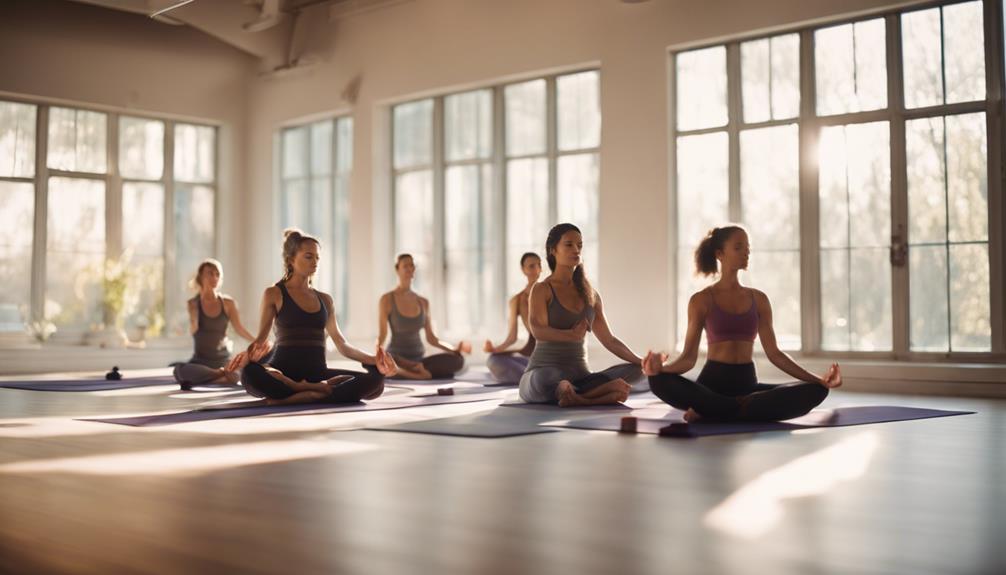
Stretching plays an essential role in enhancing your flexibility and range of motion, ultimately boosting your workout performance and minimizing injury risks. By incorporating regular stretching into your routine, you can enjoy several benefits:
- Improved Flexibility: Increased flexibility helps you perform exercises more efficiently and effectively.
- Reduced Muscle Tension: Stretching alleviates muscle tension and soreness, promoting quicker recovery after your workouts.
- Better Posture: Regular stretching enhances your posture and alignment, crucial for maintaining a healthy body and preventing chronic pain.
- Enhanced Relaxation: Stretching promotes relaxation and mindfulness, contributing to better mental health and overall well-being.
Make it a habit to hold each stretch for 15-30 seconds before and after your workouts. This practice not only prepares your muscles for exercise but also aids in recovery afterward.
Remember, flexibility isn't just about physical movement; it's also about creating a mind-body connection that fosters mindfulness. Prioritizing stretching in your fitness challenge will empower your body, enhance your performance, and support your overall health.
Nutrition and Hydration

Nutrition and hydration are essential components that fuel your fitness challenge and enhance your overall performance. A balanced diet rich in protein, healthy fats, and complex carbohydrates supports muscle repair and growth.
To boost your energy levels, focus on consuming nutrient-dense foods, including a variety of fruits and vegetables. These foods provide essential vitamins and minerals that help you stay energized during workouts.
Hydration plays a critical role in maximizing your performance, so aim to drink at least half of your body weight in ounces of water daily. This guarantees you maintain peak hydration levels throughout your fitness challenge.
Timing your meals and snacks is key; consuming protein-rich foods within 30 minutes post-workout maximizes recovery and muscle synthesis.
Don't forget to monitor your caloric intake based on your activity level. Whether you're aiming for weight loss, maintenance, or muscle gain, being mindful of your caloric needs helps you achieve your fitness goals.
Tracking Your Progress
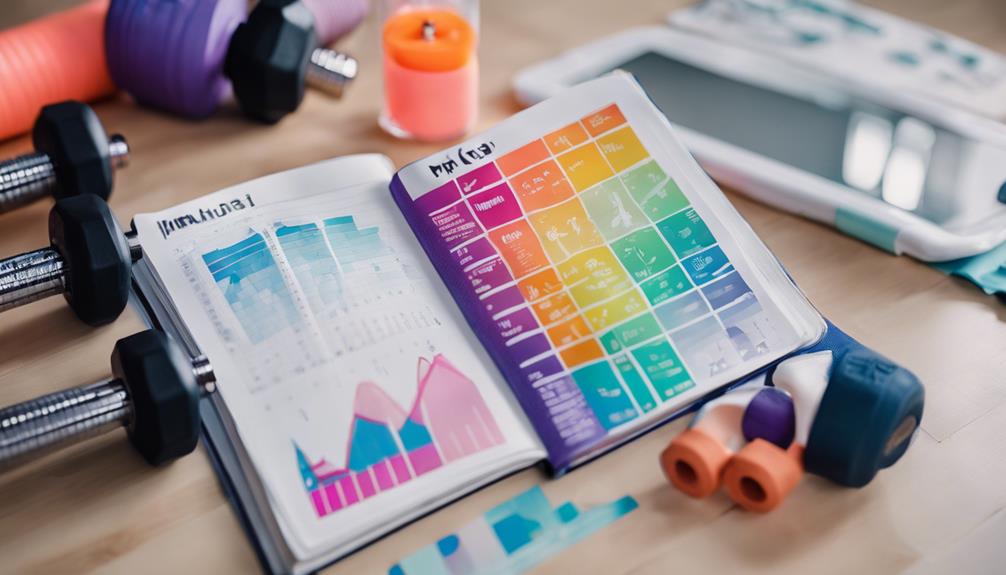
Tracking your progress is essential for staying motivated and ensuring you're on the right path to achieving your fitness goals. By monitoring your workouts, you can see how far you've come, which boosts your motivation.
Here are four effective ways to track your progress:
- Use a fitness app: Log your workouts, track reps, and weights lifted to gain insights into your improvements in strength and endurance.
- Set short-term milestones: Aim to complete a specific number of workouts each week. Achieving these goals can provide a sense of accomplishment and keep you motivated.
- Take visual progress photos: Document your journey with before-and-after pictures. This visual tracking can reinforce your commitment and show real changes.
- Assess consistency: Regularly review your workout log to identify patterns. Adjust your plan based on your performance, ensuring continued improvements and preventing plateaus.
Frequently Asked Questions
What Is the Best Exercise to Sculpt Your Body?
To sculpt your body, focus on strength training exercises like squats and push-ups. Combine them with circuit training for enhanced calorie burning, and remember to progressively increase resistance for ideal muscle growth and definition.
What Is a Body Sculpting Workout?
A body sculpting workout focuses on enhancing muscle tone and definition through targeted resistance exercises. You'll engage in movements like lunges and push-ups, promoting strength, fat loss, and a leaner physique when practiced consistently.
Can You Tone Your Body in 30 Days?
Absolutely, you can transform your body in 30 days. Think of it as planting seeds; with consistent workouts and proper recovery, you'll nurture growth, leading to toned muscles and a healthier you by month's end.
Can You Sculpt Your Body in 3 Months?
Yes, you can sculpt your body in three months. By committing to a consistent workout routine, incorporating strength training and cardio, and maintaining a balanced diet, you'll see significant changes in your muscle definition and overall fitness.
What specific workouts are included in the Fitness Challenge Workout to help sculpt the body?
The Fitness Challenge Workout includes a variety of exercises to transform your body with fitness, such as strength training, HIIT cardio, and core workouts. These workouts are designed to target different muscle groups and help sculpt a lean and toned physique. Consistent participation in these workouts can lead to noticeable changes in your body composition.
Conclusion
By now, you might think sculpting your body takes endless hours at the gym, but here's the irony: it's not just about the sweat; it's about striking a balance.
Embrace the challenge, and you'll discover that real transformation happens when you enjoy the process, not just the results.
So, while you're busy pushing through those workouts, remember that a little fun, good nutrition, and proper recovery can make all the difference.
Get ready to surprise yourself!


